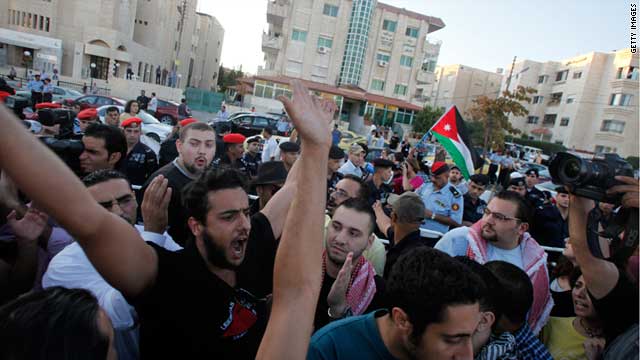By Zach Waksman
Impunity Watch Reporter, Middle East
AMMAN, Jordan – About of Jordanians gathered outside the Israeli embassy in Amman to call for the embassy’s closing and the dissolution of Jordan’s peace treaty with Israel. Prior to the event, thousands were expected to attend, and the possibility of violence led the Israeli ambassador to return home the day before. Instead, the protesters were cordoned off by a large contingent of police officers who contained them to an area outside the Kaloti Mosque, located about a kilometer away from the embassy.

The rally comes on the heels of a similar protest outside the Israeli embassy in Cairo, Egypt last Friday. There, an estimated 3,000 protesters destroyed a wall surrounding the building and then broke into the embassy. They ransacked several offices and threw papers with Hebrew writing out of windows into the streets below.
Nothing of the sort happened in Amman, in spite of calls to do so. One protest group, called “Million Man March to Close the Israeli Embassy in Jordan,” has more than 3,000 members on its Facebook page. The group’s motto is: “No Zionist embassy on Jordanian land.” Another group called for activists to mass at the Kaloti Mosque and head towards the Israeli embassy to break inside the compound and replace the Israeli flag with a Jordanian flag.
Participants were disappointed by the low turnout. “It’s a shame for Jordan,” said Samer Abu Gosh, a dentist who, like many Jordanians, is of Palestinian descent. “I expected at least 10,000.”
Jordan is one of two countries, the other being Egypt, that has signed a peace treaty with Israel. According to the New York Times, the ouster of Egyptian President Hosni Mubarak, a long-time Israeli ally, has led to a release of anti-Israeli feelings in the aftermath of the revolution. Political activist Khaled Abdul Fattah opined that the leaders of the Amman protest were inspired by the actions of their Egyptian peers after the attacked the Israel embassy in Cairo
One of the potential reasons for this lack of results may be the present status of Palestinians. Palestinian president Mahmoud Abbas has announced that he plans to seek a vote for recognition of a Palestinian state. Despite this intention, which has left Israel in a delicate situation, its possibility is uncertain. The protest in Amman called for a larger Palestine than what Abbas was seeking.
“We will not accept what Abbas is claiming,” said Rani Ayyash, a 23-year-old Jordanian of Palestinian descent. He opined that the Palestinian leader had settled for “a fifth of the Palestinian land, a third of the people and a quarter of the authority.”
To make matters worse, WikiLeaks recently released diplomatic cables that implied a U.S. plan to turn Jordan into a Palestinian state. About half of Jordan’s population is of Palestinian descent, which is part of the assumed rationale for the idea. A minority of Israelis favor the plan, but it was part of the outcry at the rally. “No to the alternative homeland and we are going to burn Israel,” participants, including the Islamic Movement, trade unions, and Pan-Arab groups, shouted.
The timing of protests on the issue may not be ideal, as evidenced by the lack of attendance. To Hassan Deiraniyeh, who lives in the area near the site of the rally, the problem is the Islamist movement, which encourages the youth to join in protests, but does not take part itself.
“What I can see is a group of enthusiastic young people but where are the leaders of the Islamic movement? None of them is here,” he said.
Abdul Fattah also felt timing was off, feeling that there were more important areas to worry about. “Maybe it is not the right time to raise demands related to the Palestinian issue. People want change in the domestic arena so far. That is a more attractive call,” he said.
But protests and rallies for domestic change have become less common. King Abdullah II has made good on his recent promise for reform, reducing the need to bring attention to it.
For more information, please see:
CNN — Israeli ambassador returns to embassy in Jordan — 16 September 2011
Jordan Times — Hundreds rally near Israeli embassy — 16 September 2011
Al Jazeera — Israel evacuates embassy in Jordan — 15 September 2011
Al Jazzera — Jordanians protest against ties with Israel — 15 September 2011
Ammon — Update: Jordanian protest demand closing of Israeli Embassy — 15 September 2011
New York Times — Anti-Israel Rally in Jordan Also Exposes Arab Rifts — 15 September 2011
Petra — Protest organized in Amman against Israeli policies — 15 September 2011
Washington Post — In Jordan, low turnout for anti-Israel march — 15 September 2011